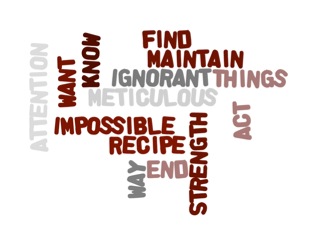30 06, 08 13:43 Filed under:
LifeEarlier this year, I posted a start of a sticky idea to mixed comments. I've been considering what I said there. I can spend a lot of time in consideration sometimes. Here's the link back to the earlier piece:
Link Back Slip over here for more ...
24 06, 08 11:18 Filed under:
LifeWhat's the most common phrase heard at the scene of traffic accidents? "I didn't even see him!" Why didn't I see him? Perhaps I was too busy looking at traffic control signs. I hadn't noticed until I read this piece (Distracting Miss Daisy) how traffic signs in this country encourage the driver to look away from their real job (watching the road). Obviously, if I'm looking at signs, I'm not looking at the car coming into the intersection in front of me. Slip over here for more ... 22 06, 08 22:46 Filed under:
LifeAt eight thirty this morning, the phone rang. My mom. Five blocks away. My dad, diagnosed two months ago with terminal cancer, was having trouble breathing. Can I come over and rummage around in the basement to find that extension tubing, so he can move around the house while connected to his oxygen-generating machine? Had they called hospice? Nope. Yea, I'll be right over. Slip over here for more ... 21 06, 08 05:01 Filed under:
WorkSo, you think you are good at multitasking? No? You say you're lousy at it, it's just that your life demands it of you? Join the club.
Slip over here for more ... 19 06, 08 23:24 Filed under:
PersonalYears ago now, more than a decade ago, I sat with JR Clark in a conference room one long, long, very long Santa Clara afternoon. We were in deep dialogue about the nature of prescriptions, recipes, and process descriptions. We shifted through what Betty Crocker could teach us in her test kitchens, and concluded that the best we'd get there would be replication. We considered what might happen if we were to go looking for a recipe for innovation --- and what we might find if we found it, and found little opportunity for replication there. Slip over here for more ... 16 06, 08 11:29 Filed under:
Work
An excerpt from a recent posting I made on the AgileProjectManagement Yahoo! Discussion Group, in response to a query about standardizing Agile practices. A perfectly reasonable-seeming thing to do.
12 06, 08 08:05 Filed under:
WorkAuthor of best-selling Fooled By Randomness and Black Swans Nassim Nicholas Taleb was being a curmudgeon again recently in The Sunday Times. A little of him goes a long, long way. AND his skepticism about how financial markets and complex systems are commonly managed seems properly placed, skepticism being as necessary to clear perception and good eyesight. Slip over here for more ... 02 06, 08 12:00 Filed under:
WorkI had no idea that cubicles were a Utopian statement, but I'm not really surprised that they are. More surprising is that someone out there is doing their PhD work on the cubicle as a statement of culture. Had to happen. Just had to happen. "Those with moral aspirations for the cubicle—from countercultural Californians like Tom Peters to Midwestern Protestants like Max De Pree—sought to defend some idea of “humanity” against the inhumanity of bureaucracy. Yet, to say that bureaucracy is inhuman has not always been an objection to it. As defined by Max Weber a century ago, bureaucracy makes its great contribution to the world precisely by ignoring the human spirit. Operating according to fixed rules, policies, and positions, bureaucracy in its purest form functions, as Weber wrote, “without regard for persons.” As bureaucracy “develops more perfectly, the more the bureaucracy is ‘dehumanized,’ the more completely it succeeds in eliminating from official business love, hatred, and all purely personal, irrational, and emotional elements which escape calculation.” The central impulse of bureaucracy is to fashion a world in conformity to the impersonal abstraction and precise relationships of an organizational chart."Here's the link 









